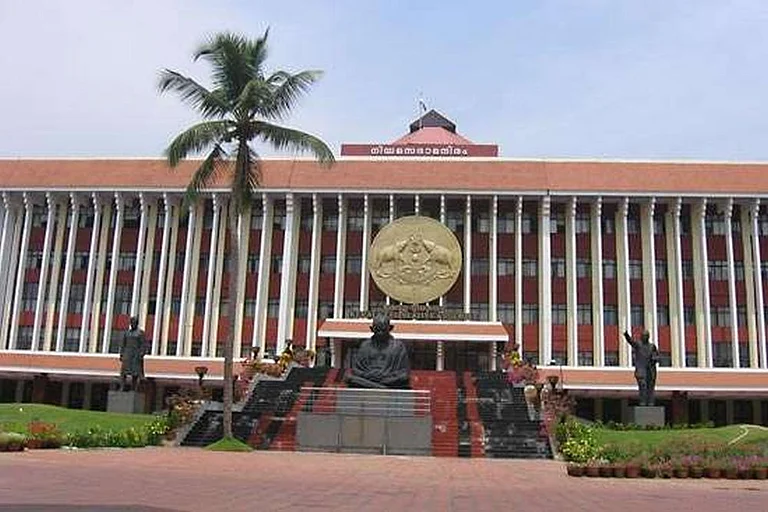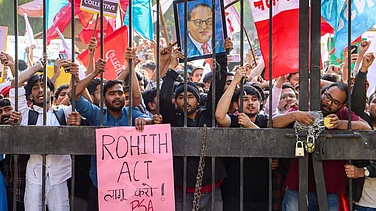The Lok Sabha on Tuesday passed the Public Examinations Bill (PEB), which is aimed at addressing the usage of unfair means in exams.
The Narendra Modi government had introduced the PEB in Lok Sabha on Monday. Following its passage in the Lower House, the bill now be tabled in the Rajya Sabha. Once the Upper House passes the bill, it will go to the Rashtrapati Bhawan for the president's assent, following which it will become a law.
In recent years, the question of cheating in exams and the irregularities in recruitment exams for government jobs, including the leakage of question papers, often became a politically sensitive issue with rival parties sparring over it. In Uttar Pradesh, Bharatiya Janata Party (BJP) and Samajwadi Party (SP) have sparred for decades over the issue of cheating in school board exams.
The PEB seeks to address these concerns by listing the offences and detailing the punishments and fines. Here we explain what the law states, what's the rationale behind it, and how politically sensitive is the issue of cheating and irregularities in exams.
Sentence Up To 5-10 Years, Fines Of Rs 1 Crore: What's In Public Examination Act?
The Public Examination Bill (PEB) lists the banned 'unfair practices' and lays out the punishments for all parties involved in the cheating.
The PEB lays out the punishment for students, organisers of exams, and also third-party service providers engaged by government authorities, such as private companies providing the technical know-how to organise online tests for recruitment for government jobs. The punishments include both prison terms and fines.
"Any person or persons resorting to unfair means and offences under this Act, shall be punished with imprisonment for a term not less than three years but which may extend to five years and with fine up to 10 lakh rupees," says Section 10 (1) of the proposed law.
The PEB makes offences under the proposed law cognisable, non-bailable, and non-compoundable, which means that arrests may be made by the police without a judge's warrant and an extrajudicial compromise may not be made to settle the case.
Notably, the PEB states that the term of the punishment would increase if senior public or private officials are involved in any crime. "Where it is established during the investigation that offence under this act has been committed with the consent or connivance of any director, senior management or the persons in-charge of the service provider firm, he shall be liable for imprisonment for a term not less than three years but which may extend to 10 years and with fine of 1 crore rupees," says Section 10 (3) of the PEB.
Similarly, if an 'organised crime' is found to occur at an institutional level, then the PEB states that its property shall be attached and proportionate cost of exam shall also be recovered from the forfeited property. At the level of persons, the proposed law states that if a person or a group of persons commit an organised crime, they shall be punished with imprisonment for a term not less than five years, extendable to 10 years, and with a minimum fine of Rs 1 crore.
As for the investigation, it has to be carried by an officer not below the rank of Deputy Superintendent of Police or (Assistant Commissioner of Police in case the district has a commissionerate system), according to the PEB.
List Of Unfair Means In Public Examination Act
The PEB lists the following as 'unfair practices' that are banned under the proposed law:
Leakage of the question paper or answer key or colluding for such leakage
Accessing or possessing question paper of OMR sheets without authorisation
Providing solutions or answers to questions in an examination without authorisation and any unauthorised direct or indirect assistance to a candidate
Tampering or answer sheets or OMR sheets
Altering the assessment except to correct a bona fide error without any authority;
Tampering with any document necessary for short-listing of candidates, finalising the merit, or rank of a candidate in a public exam
Deliberate violation of security measures to facilitate unfair means
Tampering with the computer network or a technical system used in an exam
Manipulation in seating arrangements, allocation of dates, and shifts for the candidates to facilitate cheating
Threatening the life, liberty, or wrongfully restraining persons associated with the public examination authority or the service provider or any authorised agency of the government; or obstructing the conduct of a public exam
Creation of fake website to cheat or for monetary gain
Conduct of fake exam, issuance of fake admit cards, or offering letters to cheat
How Unfair Means In Exams Is Politically-Sensitive Subject
In recent years, the issue of unfair means in public exams, particularly the leakages of question papers, has been a major issue. This has led to delays in recruitment of government jobs, piling up of vacancies in several departments, and mounting criticism for governments.
In India, government jobs remain the best way for social upliftment. The social prestige and financial security that comes with it is much valued by the lower- and middle-class Indians. The piling of vacancies, cancellation of recruitment drives, and trashing of dreams of social upliftment therefore fuel sociopolitical outrage directed at all the levels of government. The issue is so grave that when the previous Rajasthan government led by Ashok Gehlot of Congress resorted to 'bulldozer action' against an accused in a question paper leak case, an action the party otherwise heavily criticises in Bharatiya Janata Party (BJP)-ruled states.
Over the past five years, there were at least 41 cases of question paper leaks that affected a total of 1.4 crore job-seekers across 15 states, according to an investigation by The Indian Express.
In Uttar Pradesh, the issue of cheating in board exams is particularly politically-sensitive as the Bharatiya Janata Party (BJP) governments are known for clamping down on malpractices in state board exams and the party accuses the Samajwadi Party (SP) of going easy on such practices. The BJP's hawkish policy on cheating in state exams was pioneered by late Chief Minister Kalyan Singh (1991-92, 1997-99) and was then carried forward by CMs Rajnath Singh (2000-02) and Yogi Adityanath (since 2017). There is some substance to the BJP's allegation as one of the first acts of late SP patriarch Mulayam Singh Yadav after becoming the CM of UP in 1993 was to abolish the anti-cheating law enacted by the previous Kalyan Singh ministry.
"High school and intermediate students in Uttar Pradesh have a lot to thank Mulayam Singh Yadav for. One of his first acts after taking over as the chief minister late last year was to abolish the Anti-Copying Act introduced by the previous BJP government," said an India Today report from 1994, adding that the state government played down the issue of cheating.
"The number of students caught cheating this year [1994] was 19,657, much fewer compared to the 25,565 caught in 1993 when strict anti-copying measures were enforced by the BJP government. But this has more to do with the government's own efforts to play down the cheating. While official reports spoke of mass copying in about 500 centres, re-examination was ordered only in 33," said the report.
In 1993, SP even made the anti-cheating law an electoral issue and the then-education minister, Rajnath Singh, lost his seat as well over the public outrage.
"A large number of students and teachers were arrested during the examinations that year. Later, Mulayam Singh Yadav made it a huge poll issue in the 1993 assembly elections — Rajnath even lost his own Mahona assembly seat, while Mulayam formed the government in partnership with the BSP," noted Kumar Anshuman in an article for The Print.
Most of the instances of mass copying in 1993-94 were from the rural areas, and as cheating hit "an all-time high", the Yadav could take action only at its own peril, noted the India Today report.
After Adityanath became the CM of UP in 2017, anti-cheating measures were implemented again that were toned down over the years. The result was that 10.56 lakh students skipped the board exams in 2018, according to figures cited by The Print.
"You would be surprised to know that around 70 per cent of these dropouts are from other states who came only to appear in exams. Copying in examinations has become very normal in the state, and we had to end this menace," said the then-Deputy CM Dinesh Sharma to The Print.
In a note with the Public Examination Bill, Union Minister of State for Personnel, Public Grievances and Pensions Jitendra Singh said that malpractices in public exams causes delays and cancellation of exams which adversely impacts millions of youth. He further noted that there is currently no specific law to address this and "therefore, it is imperative that elements that exploit vulnerabilities of examination system are identified and effectively dealt with by a comprehensive central legislation".
"The objective of the Bill is to bring greater transparency, fairness and credibility to the public examination systems and to reassure the youth that their sincere and genuine efforts will be fairly rewarded and their future is safe. The Bill is aimed at effectively and legally deterring persons, organised groups or institutions that indulge in various unfair means and adversely impact the public examination systems for monetary or wrongful gains," said Singh in the note attached to the bill.
Singh further said that the central bill shall serve as a model draft for States to adopt at their discretion and would aid states in preventing the disruption of state-level public exams.


























